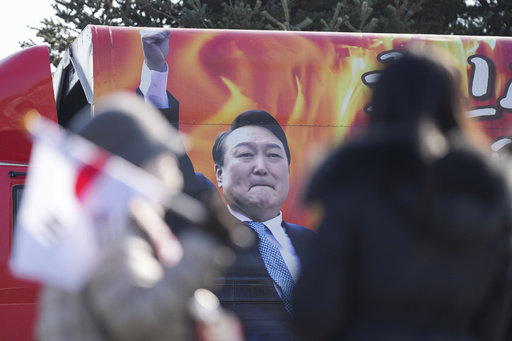SEOUL, South Korea — On Friday, law enforcement authorities took steps to secure a court warrant aimed at formally arresting South Korea’s impeached president, Yoon Suk Yeol. This move occurred as Yoon was completing his third day in a detention center following an unsuccessful last-ditch effort by his legal team to obtain his release.
Yoon was detained on Wednesday in a significant law enforcement operation carried out at his residence. He now faces serious charges related to an alleged rebellion stemming from his martial law declaration on December 3, a decision that has incited the country’s most severe political turmoil since its democratization movement in the late 1980s.
The court warrant for Yoon’s detention was initiated to compel him to engage in an investigation after he repeatedly disregarded requests from law enforcement to appear. Although the mandate remains in effect until 9:05 p.m. on Friday, he will continue to be held as the Seoul court reviews the implications of granting a formal arrest. Should a formal arrest take place, investigators would have the authority to keep him detained for an extended period of up to 20 days, during which the case would transition to public prosecutors for indictment consideration.
In an attempt to overcome legislative impasses, Yoon had imposed military rule and subsequently dispatched troops to the National Assembly as well as election offices. However, his measures led to very brief control; only hours later, lawmakers breached the blockade to vote against the protocol, ultimately resulting in his impeachment by the opposition-prevalent assembly on December 14.
The potential court-ordered arrest poses a risk of a protracted duration of detention for Yoon, who is already facing multiple criminal charges and awaits a ruling from the Constitutional Court about whether he will be unseated or returned to his position as president.
Moving ahead, the Corruption Investigation Office for High-Ranking Officials, which is conducting a joint investigation alongside police and military units, submitted a request to the Seoul Western District Court for a warrant to formally arrest Yoon.
A hearing is set to occur on Saturday afternoon, during which Yoon’s presence is uncertain, and a decision on the arrest could be released over the weekend or early the following week. Specific details surrounding the warrant request have not been disclosed, but past information has indicated that Yoon is grappling with potential rebellion-related charges.
After facing over ten hours of questioning at the anti-corruption agency’s headquarters in Gwacheon on Wednesday—during which he opted to remain silent—Yoon chose to boycott the questioning process for a second consecutive day on Friday. His supporters assert that the investigative practices are invalid. In communications relayed by his lawyers, Yoon expressed that he is managing well while in detention and expressed gratitude to supporters who rallied in inclement weather to exhibit their patriotic sentiments. Numerous supporters congregated in front of the Seoul Western District Court, chanting for his release.
Yoon’s legal team attempted to persuade the Seoul Central District Court to mandate his release, contesting the legitimacy of the detention warrant issued by the Western District Court. However, their appeal was denied late Thursday, allowing anti-corruption officials an additional nearly 11 hours to keep Yoon in custody while a petition to secure an arrest warrant was under review by the Central District Court.
Several key military officials, including Yoon’s defense minister and police chief, have already been detained for their involvement in executing martial law during this intense political episode.
If Yoon is formally arrested, it could initiate an extended period of detention, possibly lasting several months or more. Should prosecutors move forward with indictments related to rebellion and abuse of power—charges currently under investigation—Yoon might be kept under arrest for up to six months while awaiting an initial court ruling. If convicted, he could face a prison sentence that would likely be contested in higher courts. Under South Korean law, orchestrating a rebellion can incur extreme penalties, including life imprisonment or even the death penalty.
Yoon’s defense team maintains that there is no justification for detaining him during the investigation, arguing that he does not pose a flight risk or a danger to evidence integrity. Investigators counter this argument, citing Yoon’s consistent refusal to comply with multiple requests to participate in questioning and an unsuccessful attempt at detaining him earlier this year.
Yoon steadfastly rejects allegations that his decree of martial law was an incitement of rebellion, conflicting with testimonies from military leaders who have characterized his actions as efforts to its legislators. Detractors contend that his actions render him a credible threat of tampering with potential evidence related to the case.
To evade a rebellion conviction, Yoon needs to validate that his martial law was intended merely as a temporary and non-threatening notification to the opposition, which he accuses of hindering his agenda and impairing government functions through its legislative authority.
Yoon and his legal representatives assert that he never aimed to disrupt the National Assembly’s operations, claiming that the troop deployment’s objective was to maintain order rather than impede lawmakers from voting to annul martial law. They argue that the troops dispatched to the assembly were unarmed and reject claims that he ordered the arrest of prominent political figures.
Conversely, military leaders have conveyed details of an intentional strategy to commandeer the legislative body, which was ultimately thwarted by civilians and assembly staff assisting lawmakers’ entry and the troops’ reluctance to act against their orders.
Supporting evidence includes the indictment of Yoon’s former defense minister, which alleges that the president commanded military and police forces to detain key politicians or any lawmaker attempting to breach the assembly’s confines. His growing impatience as lawmakers continued to breach barricades prompted him to call military commanders to consider extreme measures to maintain control over the legislature.




